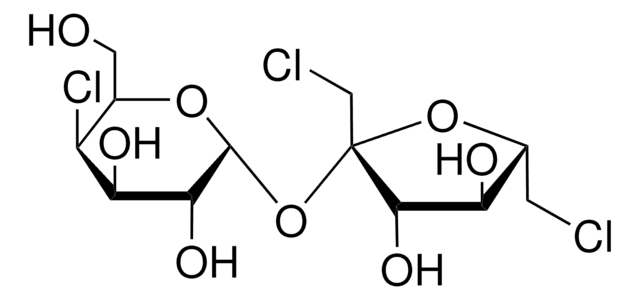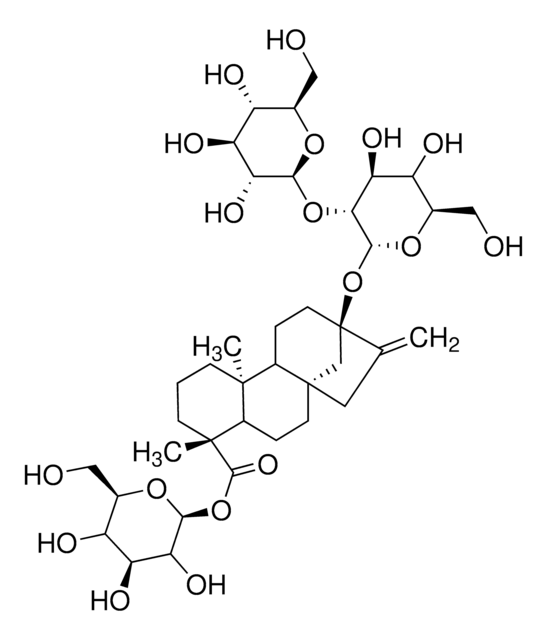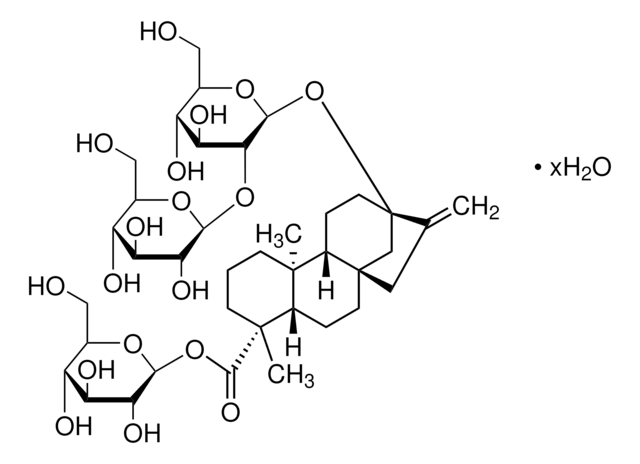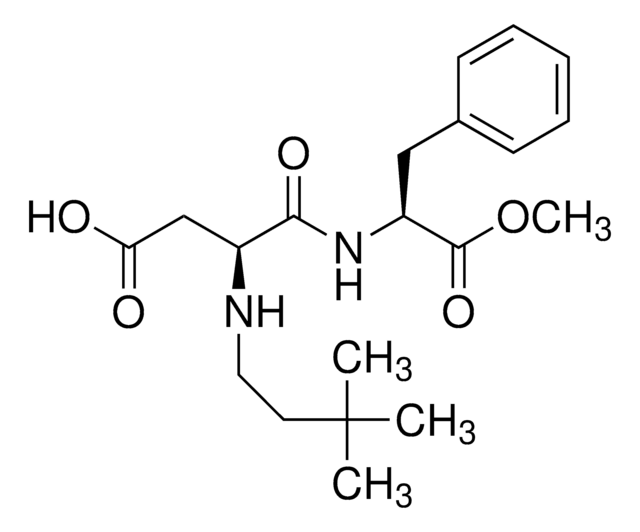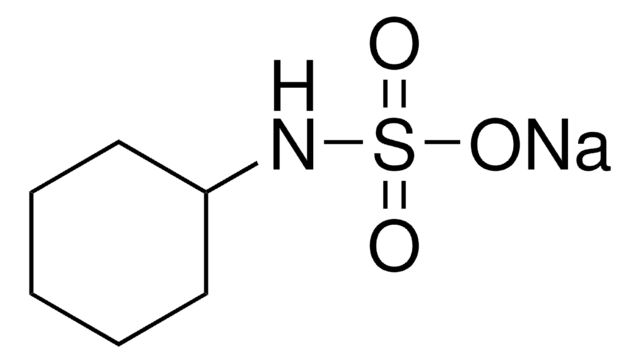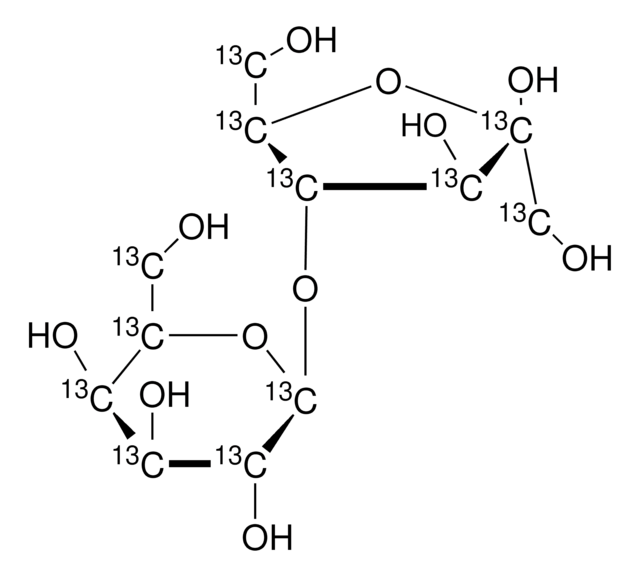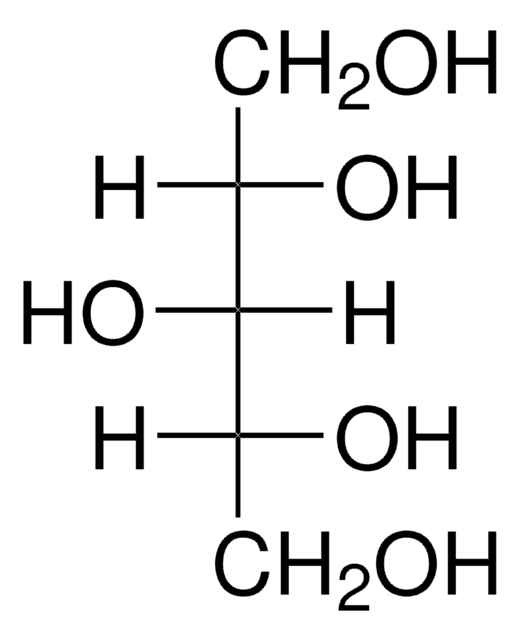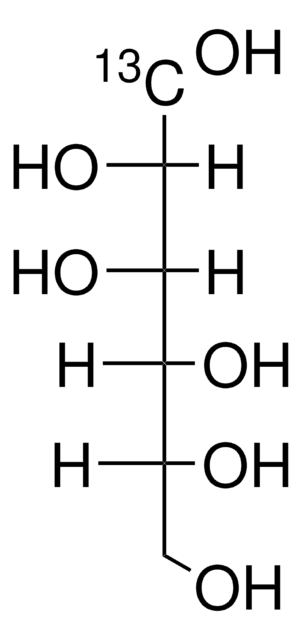69293
Sucralose
≥98.0% (HPLC)
동의어(들):
1,6-Dichloro-1,6-dideoxy-β-D-fructofuranosyl-4-chloro-4-deoxy-α-D-galactopyranoside, E955, Trichlorosucrose
로그인조직 및 계약 가격 보기
모든 사진(2)
About This Item
실험식(Hill 표기법):
C12H19Cl3O8
CAS Number:
Molecular Weight:
397.63
Beilstein:
3654410
EC Number:
MDL number:
UNSPSC 코드:
12352201
PubChem Substance ID:
NACRES:
NA.25
추천 제품
분석
≥98.0% (HPLC)
양식
powder
광학 활성
[α]/D 86.0±2.0°, c = 1 in H2O
단맛
600 × sucrose
색상
white to off-white
유용한 pH 범위
6-8 (20 °C, 100 g/L)
mp
114.5 °C ((238.1 °F ) - OECD Test Guideline 102)
solubility
~300 g/L at 25 °C (77 °F)
SMILES string
OC[C@H]1O[C@H](O[C@]2(CCl)O[C@H](CCl)[C@@H](O)[C@@H]2O)[C@H](O)[C@@H](O)[C@H]1Cl
InChI
1S/C12H19Cl3O8/c13-1-4-7(17)10(20)12(3-14,22-4)23-11-9(19)8(18)6(15)5(2-16)21-11/h4-11,16-20H,1-3H2/t4-,5-,6+,7-,8+,9-,10+,11-,12+/m1/s1
InChI key
BAQAVOSOZGMPRM-QBMZZYIRSA-N
유사한 제품을 찾으십니까? 방문 제품 비교 안내
애플리케이션
Sucralose is a non-caloric sugar used as a sweetener that activates T1R2/T1R3 sweet taste receptors and modulates glucagon-like peptide-1, glucose-dependent insulinotrophic peptide, and incretin secretion.
생화학적/생리학적 작용
A synthetic sweet tastant detectable by humans. Activates T1R2/T1R3 sweet taste receptors on enteroendocrine cells and elicits increased hormonal secretion of glucagon-like peptide-1 and glucose-dependent insulinotrophic peptide.
기타 정보
To gain a comprehensive understanding of our extensive range of Disaccharides for your research, we encourage you to visit our Carbohydrates Category page.
Storage Class Code
11 - Combustible Solids
WGK
WGK 2
Flash Point (°F)
Not applicable
Flash Point (°C)
Not applicable
개인 보호 장비
Eyeshields, Gloves, type N95 (US)
이미 열람한 고객
Nimesh Shukla et al.
Archives of biochemistry and biophysics, 639, 38-43 (2017-12-31)
Sucralose is a commonly employed artificial sweetener that appears to destabilize protein native structures. This is in direct contrast to the bio-preservative nature of its natural counterpart, sucrose, which enhances the stability of biomolecules against environmental stress. We have further
Shlomi Tamam et al.
Applied physiology, nutrition, and metabolism = Physiologie appliquee, nutrition et metabolisme, 37(3), 520-529 (2012-04-26)
The effect of short duration exercise (EXR) on food intake (FI) and energy balance (EB) is not well understood in either normal weight (NW) or overweight (OW) and obese (OB) 9-14 years old children. Our purpose was to describe the
Celeste Keesing et al.
Nutrients, 11(11) (2019-11-07)
We aimed to investigate the isolated effect of glycaemia on cognitive test performance by using beverages sweetened with two different glucose-fructose disaccharides, sucrose and isomaltulose. In a randomised crossover design, 70 healthy adults received a low-glycaemic-index (GI) isomaltulose and sucralose
Virender K Sharma et al.
Chemosphere, 87(6), 644-648 (2012-02-22)
The kinetics of the oxidation of sucralose, an emerging contaminant, and related monosaccharides and disaccharides by ferrate(VI) (Fe(VI)) were studied as a function of pH (6.5-10.1) at 25°C. Reducing sugars (glucose, fructose, and maltose) reacted faster with Fe(VI) than did
Tyson A Oberndorfer et al.
The American journal of psychiatry, 170(10), 1143-1151 (2013-06-05)
Recent studies suggest that altered function of higher-order appetitive neural circuitry may contribute to restricted eating in anorexia nervosa and overeating in bulimia nervosa. This study used sweet tastes to interrogate gustatory neurocircuitry involving the anterior insula and related regions
자사의 과학자팀은 생명 과학, 재료 과학, 화학 합성, 크로마토그래피, 분석 및 기타 많은 영역을 포함한 모든 과학 분야에 경험이 있습니다..
고객지원팀으로 연락바랍니다.
